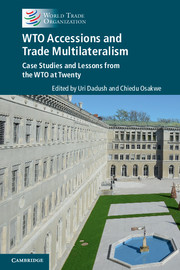Book contents
- Frontmatter
- Dedication
- Contents
- List of contributors
- Foreword
- Acknowledgements
- List of abbreviations
- Editors' note
- PART I WTO accessions, the trading system and the global economy
- 1 A reflection on accessions as the WTO turns twenty
- 2 Developments in the global economy and trading system effects: the transformation of world trade
- 3 The WTO and the global economy: contemporary challenges and possible responses
- 4 The structural reform implications of WTO accession
- 5 The macroeconomic implications of WTO accession
- 6 The future of Asia: unleashing the power of trade and governance
- 7 Eurasian Economic Union integration: timetable, priorities and challenges
- 8 WTO accessions: what does the academic literature say?
- PART II Overview: systemic outcomes from accessions
- PART III Members’ perspectives on accession negotiations
- PART IV Working party chairpersons’ perspectives on accession negotiations
- PART V Salient features inWTOAccession Protocols
- PART VI Conclusion
- Annex: Contributor biographies
- Index
- Plate section
- References
4 - The structural reform implications of WTO accession
from PART I - WTO accessions, the trading system and the global economy
Published online by Cambridge University Press: 05 November 2015
- Frontmatter
- Dedication
- Contents
- List of contributors
- Foreword
- Acknowledgements
- List of abbreviations
- Editors' note
- PART I WTO accessions, the trading system and the global economy
- 1 A reflection on accessions as the WTO turns twenty
- 2 Developments in the global economy and trading system effects: the transformation of world trade
- 3 The WTO and the global economy: contemporary challenges and possible responses
- 4 The structural reform implications of WTO accession
- 5 The macroeconomic implications of WTO accession
- 6 The future of Asia: unleashing the power of trade and governance
- 7 Eurasian Economic Union integration: timetable, priorities and challenges
- 8 WTO accessions: what does the academic literature say?
- PART II Overview: systemic outcomes from accessions
- PART III Members’ perspectives on accession negotiations
- PART IV Working party chairpersons’ perspectives on accession negotiations
- PART V Salient features inWTOAccession Protocols
- PART VI Conclusion
- Annex: Contributor biographies
- Index
- Plate section
- References
Summary
ABSTRACT
This chapter looks at the relationship between the WTO accession process and structural reforms in developing countries. It finds that developing economies that are in the process of acceding to the WTO commit to more policy reforms (proxied by prior actions in the context of the World Bank's development policy lending) than developing countries that are already members of the WTO or that have not applied to become members. It also finds that, for almost all developing economies acceding to the WTO, the country risk, measured by a composite indicator of political, financial and economic risk called the International Country Risk Guide, and the policy and institutional indicator, measured by the World Bank Country Policy and Institutional Assessment, significantly improve when a country achieves WTO membership compared with at the beginning of the WTO accession process.
Developing countries have been growing faster than advanced economies since the mid 2000s. This sustained growth has been supported by external factors, such as the expansion of global value chains, lower transportation and communication costs, buoyed global trade and easy financing conditions. But domestic factors – such as structural reforms that promote market forces, better policy-making, stronger institutions and greater trade and financial openness – have also played an important role. These reforms have increased the productivity of developing countries and allowed them to take advantage of global trade opportunities. Today their trade is growing faster than that of developed countries. The share of developing countries' trade in global trade rose from 10 per cent in the mid 1990s to more than 30 per cent by 2012.
The structural reforms undertaken by developing countries over the past two decades have varied depending on their level of income. In low-income countries, structural reforms have focused on reducing trade barriers, rolling back distortionary agricultural subsidies and price controls, reforming the banking sector and improving basic education and the institutions needed for market-based economic activity. In lower-middle-income countries, maintaining the productivity growth required reforms in the banking and agricultural sectors, reducing barriers to foreign investment, as well as increasing competition in product markets, improving the quality of secondary and tertiary education and alleviating infrastructure bottlenecks. In upper-middle-income countries, productivity enhancements came from deepening capital markets, developing more competitive and flexible product and labour markets, fostering a more skilled labour force and investing in research and development and new technologies (Christiansen, Schindler and Tressel, 2009).
- Type
- Chapter
- Information
- WTO Accessions and Trade MultilateralismCase Studies and Lessons from the WTO at Twenty, pp. 81 - 121Publisher: Cambridge University PressPrint publication year: 2015
References
- 1
- Cited by



